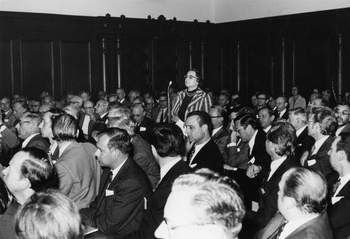
Prima inter pares? — Margot Becke (1914–2009) at the MPG General Assembly 1972 in Bremen, where she was elected chairwoman of the Scientific Council. Becke was the second woman in the history of the MPG to be assigned director of an MPI. Asked whether she considered her accomplishments as a benchmark for women in science, Becke famously replied: »The Max Planck Society is so progressive that issues such as women being underprivileged cannot be considered.« (MPG-Spiegel 4/1973; photo: Archive of the MPG)
Gender
Birgit Kolboske has explored the history of women and gender in the Max Planck Society. By combining political, historical, sociological, and legal perspectives she analyzed how gender relations have been implemented, perpetuated and protected within the generally intransparent networks and structures of the Max Planck Society—and how these have — however slightly — changed over the course of the years. This is highlighted based on the concepts of doing gender and doing office (developed by the author) in two areas: the one where only very few women were admitted: science; and the one where most of them worked most of the time: the office.
Her study Hierarchien. Das Unbehagen der Geschlechter mit dem Harnack-Prinzip was published in late 2022 in the series »Studien zur Geschichte der MPG«. There she scrutinizes the process of sociocultural and structural change from a feminist perspective. The English edition is forthcoming (2024). Studien zur Geschichte der MPG
Based on the belief that the law—despite its alleged gender neutrality—has been instrumental in women's historical subordination she has also approached gendered aspects in legal studies at the Max Planck Society. Has, for instance, its research in the field of jurisprudence been conducive to reforms in German family law and abortion law in the 1970s and 1980s? What has been the stance of the legal institutes on sexualized violence?
